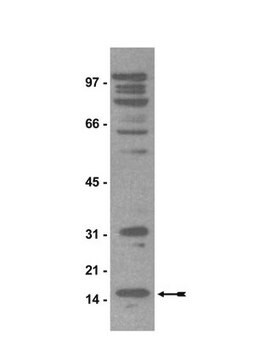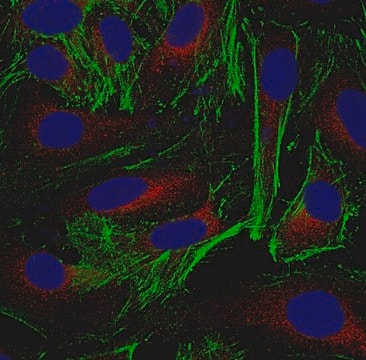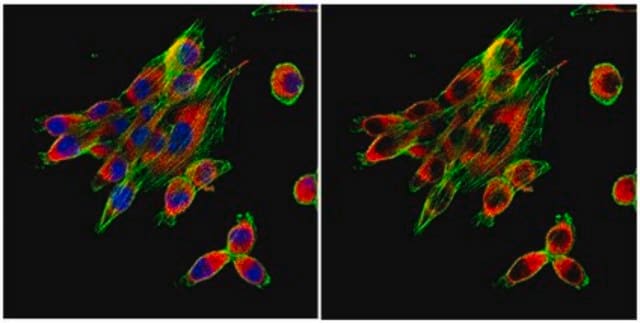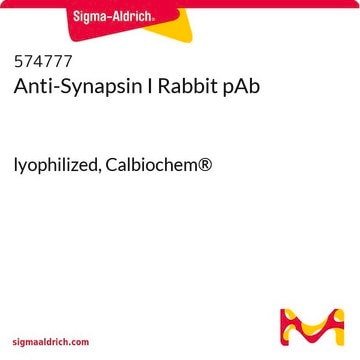05-479
Anti-Cytochrome C Antibody, clone C-7
ascites fluid, clone C-7, Upstate®
Sign Into View Organizational & Contract Pricing
All Photos(1)
About This Item
UNSPSC Code:
12352203
eCl@ss:
32160702
Recommended Products
biological source
mouse
antibody form
ascites fluid
antibody product type
primary antibodies
clone
C-7, monoclonal
species reactivity
human, horse
manufacturer/tradename
Upstate®
technique(s)
immunohistochemistry: suitable
western blot: suitable
isotype
IgG
NCBI accession no.
UniProt accession no.
shipped in
dry ice
target post-translational modification
unmodified
Gene Information
human ... CYCS(54205)
Specificity
Cytochrome c
Immunogen
Horse cytochrome c conjugated to KLH
Application
Detect Cytochrome C using this Anti-Cytochrome C Antibody, clone C-7 validated for use in WB, IH.
Research Category
Apoptosis & Cancer
Metabolism
Apoptosis & Cancer
Metabolism
Research Sub Category
Apoptosis - Additional
Enzymes & Biochemistry
Apoptosis - Additional
Enzymes & Biochemistry
Quality
routinely evaluated by immunoblot on RIPA lysates from A431 cells
Target description
14kDa
Linkage
Replaces: 04-1043
Physical form
Ascites
mouse ascites containing 0.05% sodium azide
Storage and Stability
2 years at -20°C
Legal Information
UPSTATE is a registered trademark of Merck KGaA, Darmstadt, Germany
Disclaimer
Unless otherwise stated in our catalog or other company documentation accompanying the product(s), our products are intended for research use only and are not to be used for any other purpose, which includes but is not limited to, unauthorized commercial uses, in vitro diagnostic uses, ex vivo or in vivo therapeutic uses or any type of consumption or application to humans or animals.
Not finding the right product?
Try our Product Selector Tool.
recommended
Product No.
Description
Pricing
Storage Class Code
12 - Non Combustible Liquids
WGK
WGK 1
Flash Point(F)
Not applicable
Flash Point(C)
Not applicable
Certificates of Analysis (COA)
Search for Certificates of Analysis (COA) by entering the products Lot/Batch Number. Lot and Batch Numbers can be found on a product’s label following the words ‘Lot’ or ‘Batch’.
Already Own This Product?
Find documentation for the products that you have recently purchased in the Document Library.
J E Springer et al.
Nature medicine, 5(8), 943-946 (1999-07-30)
Traumatic spinal cord injury often results in complete loss of voluntary motor and sensory function below the site of injury. The long-term neurological deficits after spinal cord trauma may be due in part to widespread apoptosis of neurons and oligodendroglia
So-Yeon Kim et al.
Oncotarget, 8(39), 64964-64973 (2016-08-05)
Small molecules to selectively induce cell death of undifferentiated human pluripotent stem cells (hPSCs) have been developed with the aim of lowering the risk of teratoma formation during hPSC-based cell therapy. In this context, we have reported that Quercetin (QC)
Rui Liu et al.
Molecular cancer therapeutics, 14(9), 2090-2102 (2015-07-05)
Tumor adaptive resistance to therapeutic radiation remains a barrier for further improvement of local cancer control. SIRT3, a member of the sirtuin family of NAD(+)-dependent protein deacetylases in mitochondria, promotes metabolic homeostasis through regulation of mitochondrial protein deacetylation and plays
Structural basis for the binding of an anti-cytochrome c antibody to its antigen: crystal structures of FabE8-cytochrome c complex to 1.8 A resolution and FabE8 to 2.26 A resolution.
Mylvaganam, S E, et al.
Journal of Molecular Biology, 281, 301-322 (1998)
Hanna J Wagner et al.
International journal of molecular sciences, 19(11) (2018-11-08)
Nanobodies, the smallest possible antibody format, have become of considerable interest for biotechnological and immunotherapeutic applications. They show excellent robustness, are non-immunogenic in humans, and can easily be engineered and produced in prokaryotic hosts. Traditionally, nanobodies are selected from camelid
Our team of scientists has experience in all areas of research including Life Science, Material Science, Chemical Synthesis, Chromatography, Analytical and many others.
Contact Technical Service








